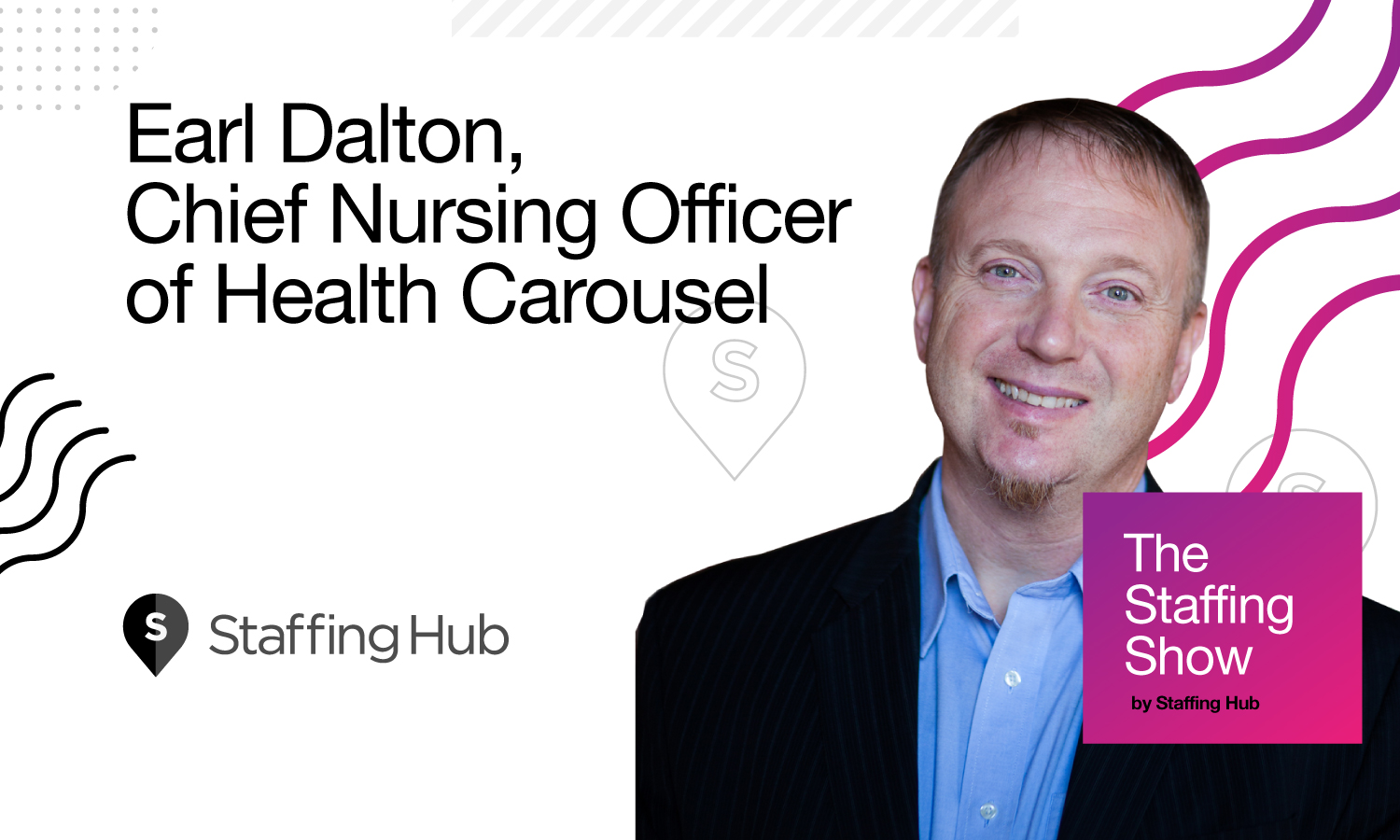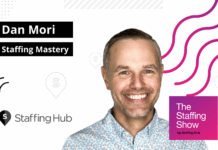
In this episode, I’m at The Travelers Conference, the only conference held just for travel nurses and healthcare staffing agencies. I interview Earl Dalton, CNO at Health Carousel, minutes after he gave an engaging conference talk on managing team conflict in nursing. We talked about the role of staffing firms in developing travel nurses, how different hospitals will be impacted by the nursing shortage, and how agility will help healthcare staffing firms survive.
Staffing Hub: So, we’re here in Vegas for the Travelers Conference talking to Earl Dalton, CNO at Health Carousel. Thanks for joining us Earl.
Earl Dalton: Absolutely, it is my pleasure.
Staffing Hub: So, you just gave a talk just minutes ago on overcoming conflict on travel nursing assignments. Can you give our listeners a little recap of that talk?
Dalton: Absolutely, I’d love to. My discussion today was targeted for nurses that are on assignment, and really it talks about a couple of different things. I think at the highest level, it talks about the perfect storm that is sort of happening, I think, at the bedside in the United States right now.
The government is trying to control spending, and we have a runaway freight train on healthcare spending, so there are a lot of interventions at the federal level and state level trying to curtail costs. So, hospitals have to do more with less.
At that same time, we are at a unique point in our industry where there are a lot of folks retiring, so there are a lot of RNs who certainly over the next 10 or so will be retiring from the industry.
And so, with nurses retiring, we lose a lot of our labor force, and then secondarily, we lose a lot of wisdom out of our craft. A lot of the folks who’ve been guiding our way aren’t going to be there anymore.
Then, thirdly, I talk about the stages of team formation and team development: forming, storming, norming, and performing. When I bring up those concepts in and around what is a perfect storm in the United States of more tension, more stress, less experienced people around. I think those that take assignments around the United States have to be more equipped than ever to understand conflict is natural in the formation of a team and to understand how to overcome it.
The secret sauce in the whole talk is really centered around how normal it is to have a storming phase when you have a new team.
There are books written, actually, on how you overcome that conflict. You need to have open, regular, and frequent conversations with your leader on site to make sure things are going well.
So, I picture it looking something like this. A traveling nurse who’s on assignment can say to their charge nurse or their manager, “Hey, how’s it going for you? How am I performing? Are there any issues that you see in my care?” Then, conversely, a manager can ask the nurse, “How are we performing for you? Does this feel right?”
In doing that, this can be just a conversation in the beginning of the partnership. But when folks don’t tackle things in a healthy way, we’re sort of shaking a soda can, right?
So, more and more pressure is building up and then there’s such a divide that it can’t be closed. How that expresses for me, from my chair, is that all of a sudden the nurse’s attendance to the job starts to go down. They’re calling off shift more and more. They’re less and less satisfied with the work their doing, and that’s important to me. I want people to be really happy with the work they’re doing. I’d like for the hospitals and those folks to be happy with the nurses’ performance as well. Those things are critically important.
And I think through healthy discussion, and people coming with a healthy skillset into their discussions, it can be overcome.
So, that’s a lot of what that talk is about. We’re in a time of stress, more than we’ve even been due to factors that are at a macro level I think, affecting our industry. So, it’s about the skillset of a nurse and the leader. About whether you can have a healthy, regular conversation around conflict and those sorts of things.
Staffing Hub: I feel like that gives me a little window into your work as a CNO for a healthcare staffing firm, but can you talk a little bit about that because it seems like a unique position?
Dalton: Yeah, absolutely. So, it is incredibly unique for me as a nurse to sit. The nursing staff that I get a chance to work with are not directly in front of me, I can’t just run the floor to floor every day as has been in my past.
So, we depend a lot on triggers and alerts through our recruiting staff and account managers and folks like that to help tip us off that there might be issues on assignments for nurses.
Again, one of the things that I value the most is whether or not people are having a positive experience because I know that when folks are having a positive experience, patients will get better care. That’s been studied. So, we listen a lot from my position to recruiters. I ask: “Tell me about what you’re hearing with your nurses. Are they getting to work? Are they calling off? Are they doing those sorts of things because those would be indicators things aren’t right.”
Those are places where I get a chance to advocate for our staff, to maybe phone up a hospital and say, “Hey, tell me about what’s happening with the folks that are working for us.” So, part of my role is to be an advocate for the nurse. Through that, I’m an advocate for the patients that they represent. And so I take that work incredibly seriously as I roll through any one of my days.
Another important part of that job is being a coach and mentor and a developer of people. I’m a hockey guy – and Gretzky said he loved coaches that could push him and develop him into greater things. I believe that to be true for the staff that comes to work for us, too.
They want to know where they could’ve done better. They want that feedback. And so part of my job is to hold a mirror up and reflect their care back to them so that they can see it in a real way. That is objective, that might help them see the things that they’re good at and things that they’re not good at so they get a chance to do better.
So, when I sandwich those two things together, it’s really about being a strong advocate for nurses who are out there doing this work and helping patients and making healthcare work better all over the country. And, then I combine that with each one of those people I feel a duty to develop and to try to give them just one thing in the time they may have worked with us, “Hey, you might want to think about looking at any number of things that they’re doing to make sure that they get a chance to grow and develop.”
Staffing Hub: It seems like you are really able to hold the patient in the center of the work that you do too. That makes sense with your experience as a CNO. For recruiters and staffing execs who don’t necessarily have that hands-on experience, do you have any advice on how they can keep that quality of care at the center of the work that they do?
Dalton: Yeah, absolutely. So that’s the hidden and third pillar of my job. So, you’re right, as a nurse, nurses are often, I feel, called to the position, and so I feel an incredible duty to the patients, whether they are directly touched by my hands or indirectly through the people that serve us. And so along with being a great advocate and a great coach for our nurses, the third role I feel like I have as the CNO of Health Carousel is to help train the internal staff. And reflect to them that there is a patient in the center of what we do.
We are deeply tied to our mission, which is to improve healthcare and improve lives. So, I hold things that are called Campfire Talks. They’re really sort of Lunch and Learn environments where we’ll discuss how things really are for nurses. Here’s what a nurse may be expressing to you but understand the five patients behind her that she’s taken care of on any given assignment. So the team that I’m responsible for at Health Carousel, we spend a lot of time getting in front of our recruiters and account managers similarly, and we’ll talk a lot about “What does it mean to be a med-surg nurse? What does that look like? What does it mean to be an intensive care nurse? What kinds of patients are those?”
We really work hard on that educational role internally in our company. We feel pretty dedicated to that because we know that ultimately our recruiters and account managers are touching those patients through the nurses they employ, and they should know what an impact that makes.
Staffing Hub: You mentioned some of the macro trends that are impacting the industry as a whole, such as the incredible burden of spend in healthcare or the nurse staffing shortage. How do you anticipate the industry changing in the next few years?
Dalton: Great question.
One of the things that’s emerging out of the research that’s been done around the demographics of nurses exiting through retirements is that it’s going to be a regionally specific thing. Ohio may not feel it as bad as Oregon and Oregon may not feel it as bad as California and on we go.
So, it just turns out through the randomness of demographics, there are places in the country where there are younger people, and there are places that have older populations. What we’re going to see, I think, over the next 10 to 15 years are regionally specific shortages in nursing. You may go to a conference and a CNO two rows down says “yeah, no, it’s not that bad, we’re able to recruit and get nurses to come to work.” The CNO two doors up is going “God, I wonder what’s wrong with us, why can’t we?” But, regionally they come from different places that just have different demographics that they can pull from to get nurses to come to work there.
I think certainly within the staffing industry it’s clear that a couple of things are trending now. First off, hospitals are defining their quality through nursing and nursing care. So, things that we would call nurse-sensitive indicators like falls rates and infection rates in hospitals are going to be defined by the strength of the nursing care that’s in a hospital. The better off your nursing team is, the more of that they put on the billboards to say how the hospital is great.
So, hospitals want nurses who are more formally trained, with BSN and higher formal degrees, and they’re pushing for that. I think we’re going to see that trend continue where the most marketable nurse is clearly the one who has experience but also has a lot of formal education behind their name.
I think there will be mecca places where there are lots of short assignment nurses, travel nurses, that sorta thing, and places that aren’t dipping from that well as much because they just have been blessed with a demographic that’s a little different.
Staffing Hub: Education is something that’s come up a lot today at the conference and the role of nursing education in helping stem the shortage. Do you think there’s anything from a staffing agency perspective that staffing execs or recruiters even could do to help this gap in education?
Dalton: Absolutely. So I think the companies that are forward-thinking and are investing in the development of this sector of the industry are the ones that are going to win because, as I pointed out, Gretzky’s best coaches were the ones who pushed him and developed him.
A nurse who lives in one hospital under one roof with a leadership team gets consistent feedback and can grow and develop with what their strengths and weaknesses are because they likely have a fairly stable leadership team under one roof.
Nurses who jump in and out of assignments over 13 weeks, over a career, in many ways don’t get consistent feedback over time. So, I think it’s the staffing companies’ duty to own that space.
The most forward-thinking agencies are offering nurse certifications, will help you join your professional body whether it’s the critical care professional organization or the OR or wherever it is helping people bridge those gaps so that the people can see there are advantages to that additional knowledge that those associations have.
What’s nice is that the associations are out there, right? So, there’s a critical care association, and an OR, and an L & D/mother-baby area and all that. So, it’s about how do we connect people into them.
I don’t think staffing companies have to think up how to develop the nurses but we have to bridge those connection points.
In 2011, the IOM, the Institute of Medicine, came out with a huge report that told us that nursing is going to have to invest in more formal education to survive through the 2020’s and beyond.
There’s an initiative out there to have 80% of the nursing world with a BSN or stronger by 2020. And in 2018, we’re only about 54% of the way there; so, we’re not likely to hit the mark by 2020.
But, that’s the push, for companies like the one I’m working with and folks in this sector to find a way to connect our nurses into that. So, programs of transitions of practice where I’m a med-surg nurse but I would like to become an ICU nurse — let’s guide a pathway for that.
Some of the most forward-thinking folks that I get a chance to partner with, peers of mine in the industry, we’re really talking about: what would a transition in practice look like? If a nurse is not capable of the next level of care and would like to be, but constantly does 13-week assignments — how do you bridge that skills gap?
I think that’s a partnership of technology, with companies like HealthStream, which are learning management systems, to give them the competencies internally, and then partner with organizations where they can express that competency and skill. Where they get floating opportunities to do intensive care and to the OR and that sort of thing.
We’re clearly doing a lot of work on that internally at Health Carousel and some of the most forward-thinking folks in my industry and doing the same thing, trying to form those partnerships.
Staffing Hub: I feel like you really highlight the fact that the staffing agency is a point of continuity for travel nurses. They’re changing hospitals maybe every 13 weeks but you guys are always there with them. I’m wondering, outside of professional development, which is obviously huge, but what other ways can staffing firms think about keeping their travel nurses happy?
Dalton: There are a couple of different ways to approach it. I think you can have recruiters that are specialized — I’m just an ED recruiter and that’s all I’ll do and I know that world incredibly well — and so they’re better at making matches for people in the world. Or folks that have built out a real family atmosphere, I see that a lot playing out.
But I think it’s about developing an internal staff that is meeting that need for what these folks are looking for that are on travel assignments. Connection to professional development, clearly I think that’s a big piece of what they want. Developing transition to care practice plans, where they can become something different if they’re involved in that sort of thing.
Those are the things I think that folks want to take from us. They’re not working permanent jobs because they’re not interested in something deeper than that. They want to have a wide variety of choice with somebody who understands how to place me specifically, because I’m a different kind of nurse, I’m a ED nurse or an OR nurse or whatever.
Those are things that I see that are working well in the industry, that nurses that we’re working with really like plugging into.
Staffing Hub: What would you say is on the horizon for Health Carousel?
Dalton: On the horizon for Health Carousel? Wow, that’s a big question.
I am challenged every day by the leaders that I get a chance to work with, not build things for now, but to build things for their future.
We constantly push ourselves to not try to be a now-company — I need a process that will work for the group that I’m working with now. What would that look like as we grow and as the conditions continue to change, so I think there’s a couple of things. And then I think you have to have people who really understand the macro environment of “where is the government likely to take things?” Because there are things that are being affected there, from immigration through fiscal responsibility at the hospital level.
I think even at a little bit more of a microphase, hospitals are joining systems together. There is a lot of thought out there that the future of healthcare in the city is one super-system, not multiple systems competing within a city, that’s not enough economic force in that.
I think the companies that will succeed in the future are really understanding what the government is trending to do and what the legislation will look like. I think smart business analytics around what companies do we see partnering together, one’s buying the other out, that sorta thing from a hospital perspective will really guide where folks go for the future.
Then, how do you get out of your own way to maximize into a workforce that needs to be agile, that needs to move fast. The biggest thing I see in that is not clinging to cultural rules and traditions. I think some of the most successful businesses out there don’t cling to those sorts of things. They never say: we’re doing it this way because it’s always done it this way. And, in fact, that might be a reason to not do it that way.
So, I really feel like the leadership that I get a chance to work with really do push us to think: “How do we do it differently tomorrow than we’re doing it today?”
Want more staffing industry interviews? Check out all our podcast episodes.






